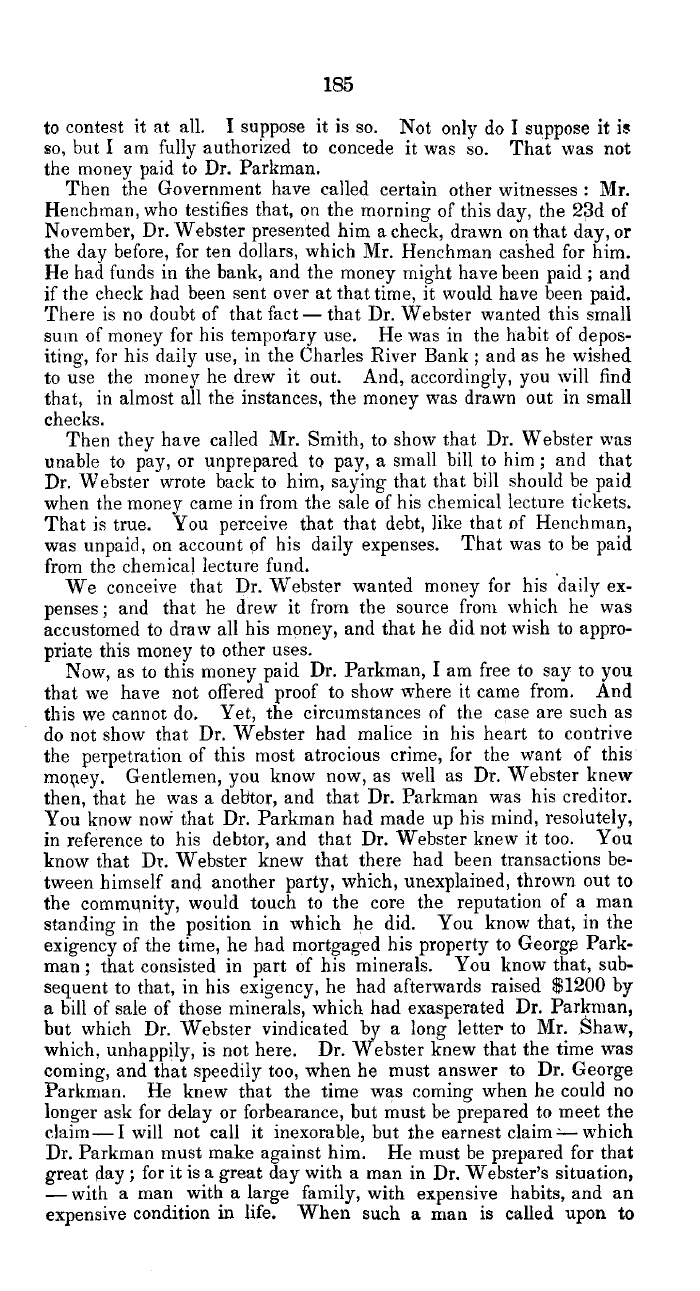|
185
to contest it at all. I suppose it is so. Not only do I suppose it is
so, but I am fully authorized to concede it was so. That was not
the money paid to Dr. Parkman.
Then the Government have called certain other witnesses : Mr.
Henchman, who testifies that, on the morning of this day, the 23d of
November, Dr. Webster presented him a check, drawn on that day, or
the day before, for ten dollars, which Mr. Henchman cashed for him.
He had funds in the bank, and the money might have been paid; and
if the check had been sent over at that time, it would have been paid.
There is no doubt of that fact- that Dr. Webster wanted this small
sum of money for his temporary use. He was in the habit of depos-
iting, for his daily use, in the Charles River Bank ; and as he wished
to use the money he drew it out. And, accordingly, you will find
that, in almost all the instances, the money was drawn out in small
checks.
Then they have called Mr. Smith, to show that Dr. Webster was
unable to pay, or unprepared to pay, a small bill to him ; and that
Dr. W ebster wrote back to him, saying that that bill should be paid
when the money came in from the sale of his chemical lecture tickets.
That is true. You perceive that that debt, like that of Henchman,
was unpaid, on account of his daily expenses. That was to be paid
from the chemical lecture fund.
We conceive that Dr. Webster wanted money for his daily ex-
penses; and that he drew it from the source from which he was
accustomed to draw all his money, and that he did not wish to appro-
priate this money to other uses.
Now, as to this money paid Dr. Parkman, I am free to say to you
that we have not offered proof to show where it came from. And
this we cannot do. Yet, the circumstances of the case are such as
do not show that Dr. Webster had malice in his heart to contrive
the perpetration of this most atrocious crime, for the want of this
mopey. Gentlemen, you know now, as well as Dr. Webster knew
then, that he was a debtor, and that Dr. Parkman was his creditor.
You know now that Dr. Parkman had made up his mind, resolutely,
in reference to his debtor, and that Dr. Webster knew it too. You
know that Dr. Webster knew that there had been transactions be-
tween himself and another party, which, unexplained, thrown out to
the community, would touch to the core the reputation of a man
standing in the position in which he did. You know that, in the
exigency of the time, he bad mortgaged his property to George Park-
man ; that consisted in part of his minerals. You know that, sub-
sequent to that, in his exigency, he had afterwards raised $1200 by
a bill of sale of those minerals, which had exasperated Dr. Parkman,
but which Dr. Webster vindicated by a long letter, to Mr. Shaw,
which, unhappily, is not here. Dr. Webster knew that the time was
coming, and that speedily too, when he must answer to Dr. George
Parkman. He knew that the time was coming when he could no
longer ask for delay or forbearance, but must be prepared to meet the
claim-I will not call it inexorable, but the earnest claim=which
Dr. Parkman must make against him. He must be prepared for that
great day; for it is a great day with a man in Dr. Webster's situation,
-with a man with a large family, with expensive habits, and an
expensive condition in life. When such a man is called upon to
|

